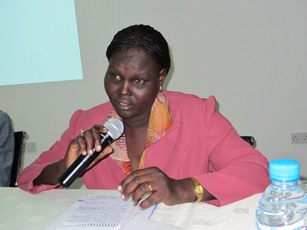S. Sudan minister warns of environmental risks in pipeline project
By Julius N. Uma
June 21, 2012 (JUBA) – As South Sudan prepares for commencement of the long-awaited construction of a pipeline for its crude oil, its deputy minister for petroleum and mining on Thursday warned of the environmental and social dangers involved, if affected areas are do not have the proper impact assessments.

“Now we have areas with crude oil. [But] If we don’t conduct assessments, especially environmental and social impact assessments, in these communities, we are going to experience many conflicts as a result of the pipeline construction,” she told participants attending a workshop in Juba, South Sudan’s capital.
Oil revenues, prior to the shut down early this year, accounted for nearly 98 percent of South Sudan’s annual budget. The country took with it nearly 75 percent of oil resources when it seceded from neighbouring Sudan in July 2011.
According to the deputy minister, the pipeline project, involving Kenya, Ethiopia and Djibouti will require various stages, before actual construction work begins.
This includes “drafting an agreement and discussions between South Sudan and the three countries involved,” she noted, adding that similar studies are to be done with Ethiopia and Djibouti.
There will also be the legal procedural phase, which involves the signing of inter-governmental agreements with the three countries before the actual commencement of the pipeline construction.
“Once we sign these agreement, we shall have included all the required legal obligations that can avoid conflict outbreak and mass displacement of the population,” she assured.
A recent report on community engagement in land agreements warns of potential threats and conflict that could result in South Sudan with the rapid expansion expected in the oil, mining and gas sectors in the world newest nation.
Lack of community involvement in investment decision-making, the report says, could give rise to investment agreements that threaten to impoverish, rather than empower, the host communities.
“This can spur conflict and undermine peace-building efforts. In certain circumstances, it may also constitute a violation of international human rights law,” partly reads the report released by South Sudan Law Society (SSLS).
Bol, who officially launched the report, emphasised the importance of “responsible” investment, which she described as a tool for sustainable development.
“For any responsible investment, we expect a company or investors to fulfill the legal obligations in place, including respecting the human rights of the communities in South Sudan through local consultations
with them,” she said.
Although South Sudan still lacks the necessary legislation such as the Petroleum and Mining Bill, the deputy minister expressed optimism that these laws will soon be in place, and every investor or company with stakes in the South Sudan will have to abide with these legal obligations, including the 2009 Land Act.
She called for strong community financial management systems, widely seen as basic structures and procedures that are necessary for transparent and accountable administrative transactions on land-related issues within the various communities in South Sudan.
David Deng, author of the detailed report also warned of the dire consequences of not consulting communities, prior to any investment decision, citing “increased poverty, hunger, and violent conflict.”
Any successful investment, he noted, lies in strong relationships between companies, host communities, and government institutions. Meanwhile, Dong Samuel Luak, an official from SSLS largely blamed politicians for inciting many of the land-related conflicts in South Sudan, rather than contributing to widespread dissemination of the Land Act.
“No matter how much power the current leadership may wield, they have to keep in mind that people will fight for their future rights to land ownership in the country,” Luak said.
(ST)
